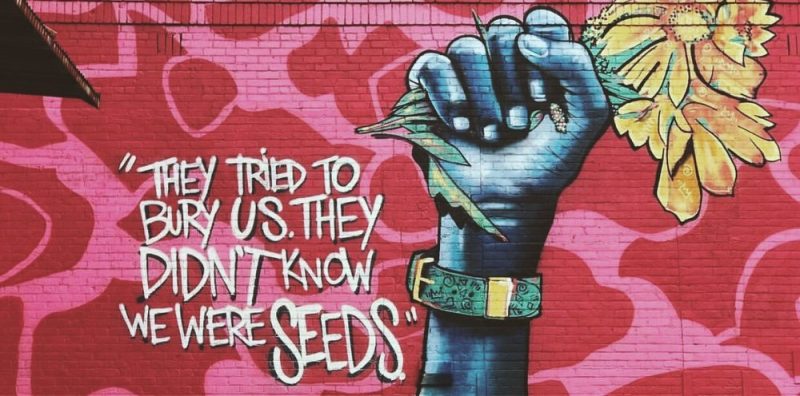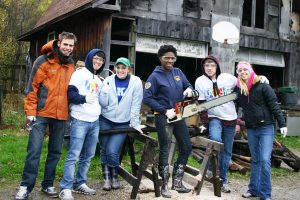The readings from the past two weeks have me thinking a lot about the act of decolonizing and all that comes with the process. It requires a great deal of work. I find myself having to train my thought process when I think about it. Tiffany Lethabo King says that decolonizing will require misandry, misanthropy, and skepticism. These are all words I have considered to have a pejorative connotation, words/feelings I have been trained to stay away from when it comes to interpreting academic writing and research. Then, it dawned on me that we have been so consumed by colonial frameworks, that we don’t know how to operate otherwise so, that means there must be tension and struggle. We cannot overcome it without a fight. There is a real feeling of discomfort within this struggle, something that I have never felt before. It is different from the push back we get when fighting for social justice issues. Our society is used to people fighting for the rights of the marginalized, we can see it in how racism continues to adapt to the times but, fighting for a complete overhaul of the way we think and see people is something new.
Eve Tuck and K.W. Yang talks about this newness (I could not think of another word to describe the feeling) that comes with the work of decolonizing. It is something completely different. It is something that will always be uncomfortable because we cannot let it become routine or be domesticated. The work cannot be tamed if it supposed to completely wreck the status quo. I need to get used to this discomfort; I need to be OK with being “unsettled” as Tuck and Yang say. While I can already see myself acting on my decolonial desires, I still have a ways to go. I feel like a part of process of fully accepting my decolonial desires is questioning my automatic tendency to want to find unity or harmony. I need to be OK with things (especially in academia) not connecting. I used to try my hardest to find myself in a lot of this old, stuffy academic writing and would be discouraged when didn’t see myself. There came a point a in time when I was so blase and uninterested in reading things written by old white men ( I still feel this way, honestly). King reassures me that I should not have reason or search for myself in the text because it was not written for me. She has made me realize that I have already been actively refusing the colonizer, refusing the Western mode of thought (decolonial desires are made in colonial settings, right?!).
I also read Bettina Love’s “Difficult Knowledge: When a Black Feminist Educator Was Too Afraid to #SayHerName”. While her focus of her article was mainly discussing how academia and the education system (along with other societal factors) have made it easy for us to forget the very real plight of black women, it also got me thinking more about the decolonial refusal. I think a part of the refusal King speaks about in her piece also involves the centering of black women. Love mentions how her young, female students can talk about the state-sanctioned killings of black with ease but rarely bring the murders of black women. Black death has become a natural part of our society. When we talk about it, we are usually only talking about black men. It’s like they are the status quo in a sense (a status quo that we always must address during the act of the decolonizing). We have been programmed to not think of ourselves (black women) and liberation at the same time. Decolonizing must also address that in ways that go beyond just demanding certain rights and liberties, right? What would a decolonized BLM protest/movement look like? Is the current M4BL (Movement For Black Lives) a decolonized space? Moreover, I am concerned about the extra labor that comes with having to manually center myself. Is the extra labor a part of the refusal process King discusses ? What would be a decolonized approach look like? Black women already do a large amount of the work in the movement; in a decolonized space is the work still on their backs?
CITATIONS:
King, Tiffany Lethabo. “Humans Involved: Lurking in the Lines of Posthumanist Flight.” Critical Ethnic Studies, vol. 3, no. 1, 2017, p. 162., doi:10.5749/jcritethnstud.3.1.0162.
Love, Bettina. “Difficult Knowledge: When a Black Feminist Educator Was Too Afraid to #SayHerName.” English Education, vol. 49, no. 2, Jan. 2017.
Tuck, Eve, and K Wang Yang. “Decolonization Is Not a Metaphor.” Decolonization: Indigeneity, Education& Society, vol. 1, no. 1, 2012, pp. 1–40.

 shave led me to this moment. I have continued to build the “life vocabulary” I first started at Allegheny. I have the skills and understanding of how the world works from my time as VISTA; and now, I’m filling myself with knowledge I need to truly become a decolonized scholar. I am by no means near my goal or know all the things but I’m getting there. As I get deeper and deeper into my graduate studies, I moving away from only being interested in researching community-engaged teaching and learning and its effect on marginalized youth into a wider frame of decolonized education for unheard and marginalized, black K-12 students.
shave led me to this moment. I have continued to build the “life vocabulary” I first started at Allegheny. I have the skills and understanding of how the world works from my time as VISTA; and now, I’m filling myself with knowledge I need to truly become a decolonized scholar. I am by no means near my goal or know all the things but I’m getting there. As I get deeper and deeper into my graduate studies, I moving away from only being interested in researching community-engaged teaching and learning and its effect on marginalized youth into a wider frame of decolonized education for unheard and marginalized, black K-12 students.
